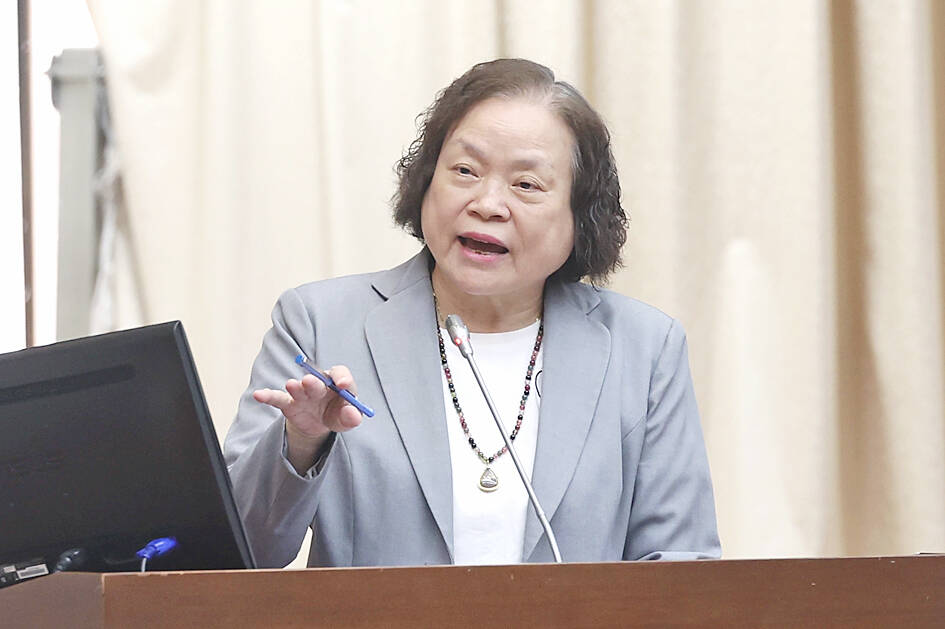Taiwan yesterday cut its GDP growth forecast for this year to 3.1 percent, marginally lower than the previous estimate of 3.14 percent, weighed by expectations of a sharp slowdown in the second half due to global trade tensions and tariff pressure from the US.
The Directorate-General of Budget, Accounting and Statistics (DGBAS) said economic momentum is likely concentrated in the first half with a growth of 5.35 percent, but might weaken to 1 percent for the remainder of the year.
DGBAS Minister Chen Shu-tzu (陳淑姿) attributed the expected slowdown to attenuated global demand and the impact of US protectionist trade policies under US President Donald Trump.

Photo: CNA
Taiwan’s traditional high season for exports — typically driven by strong holiday demand for consumer electronics in Western markets — might be muted by trade uncertainty and tariff volatility, Chen said.
The IMF last month downgraded its global trade growth forecast for this year to 1.7 percent, from 3.2 percent in January, citing declining momentum across key economies, she said.
Despite the global headwinds, Taiwan’s tech sector remains robust so far, as electronic components and information communications technology products make up nearly 70 percent of outbound shipments, benefiting from keen artificial intelligence (AI) infrastructure demand, the statistics agency said.
Major cloud service providers and national governments are aggressively expanding computing power, while supply chain bottlenecks have eased, paving the way for continued export growth, Statistics Department head Tsai Yu-tai (蔡鈺泰) said.
That explained why Taiwan’s economy grew 5.48 percent in the first quarter from a year earlier, slightly above last month’s estimate of 5.37 percent and significantly stronger than February’s forecast of 3.46 percent.
However, the bulk of exports would likely take place in the first half of the year, with a volume of US$275.7 billion, up 22.55 percent from a year earlier, largely on the back of front-loading to dodge US tariffs, the DGBAS said.
Exports are expected to contract 3.2 percent to US$242 billion in the second half, mitigating full-year growth to 8.99 percent at US$517.7 billion, Tsai said, adding that tariffs and foreign exchange rates carry a heavy weight in deciding market directions.
Sweeping tariffs on global trading partners would also negatively impact Taiwanese goods made in third countries and shipped to other destinations, Tsai said.
Private investment would be another bright spot, helped by the AI boom that would lead semiconductor suppliers to expand advanced manufacturing and packaging capabilities, the DGBAS said.
However, a cooling real-estate market and persistent geopolitical risks have tethered overall investment interest.
The agency is now looking at investment growth of 5.77 percent, a downward revision of 0.41 percentage points from the previous prediction.
Consumer spending remains resilient, thanks to a stable labor market, rising wages and higher dividend payouts from listed companies, it said.
Nevertheless, mounting global economic uncertainty and financial market volatility are restraining confidence, it said.
Private consumption is forecast to grow 1.64 percent this year, down 0.48 percentage points from the earlier projection, the DGBAS said.
Against that backdrop, Taiwan’s consumer prices might rise 1.88 percent, indicating manageable price pressures despite external risks, it said.

South Korea’s equity benchmark yesterday crossed a new milestone just a month after surpassing the once-unthinkable 5,000 mark as surging global memory demand powers the country’s biggest chipmakers. The KOSPI advanced as much as 2.6 percent to a record 6,123, with Samsung Electronics Co and SK Hynix Inc each gaining more than 2 percent. With the benchmark now up 45 percent this year, South Korea’s stock market capitalization has also moved past France’s, following last month’s overtaking of Germany’s. Long overlooked by foreign funds, despite being undervalued, South Korean stocks have now emerged as clear winners in the global market. The so-called “artificial intelligence

NEW IDENTITY: Known for its software, India has expanded into hardware, with its semiconductor industry growing from US$38bn in 2023 to US$45bn to US$50bn India on Saturday inaugurated its first semiconductor assembly and test facility, a milestone in the government’s push to reduce dependence on foreign chipmakers and stake a claim in a sector dominated by China. Indian Prime Minister Narendra Modi opened US firm Micron Technology Inc’s semiconductor assembly, test and packaging unit in his home state of Gujarat, hailing the “dawn of a new era” for India’s technology ambitions. “When young Indians look back in the future, they will see this decade as the turning point in our tech future,” Modi told the event, which was broadcast on his YouTube channel. The plant would convert

‘SEISMIC SHIFT’: The researcher forecast there would be about 1.1 billion mobile shipments this year, down from 1.26 billion the prior year and erasing years of gains The global smartphone market is expected to contract 12.9 percent this year due to the unprecedented memorychip shortage, marking “a crisis like no other,” researcher International Data Corp (IDC) said. The new forecast, a dramatic revision down from earlier estimates, gives the latest accounting of the ongoing memory crunch that is affecting every corner of the electronics industry. The demand for advanced memory to power artificial intelligence (AI) tasks has drained global supply until well into next year and jeopardizes the business model of many smartphone makers. IDC forecast about 1.1 billion mobile shipments this year, down from 1.26 billion the prior

People stand in a Pokemon store in Tokyo on Thursday. One of the world highest-grossing franchises is celebrated its 30th anniversary yesterday.